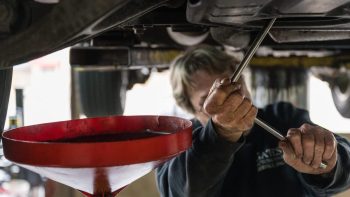Retiring an old car
TEXT OF STORY
Tess Vigeland: One of the things that people do in an economic downturn is re-evaluate whether they really need that new sweater or couch or car. In fact a recent study shows people are keeping their cars longer and holding off on new purchases.
Selling your car can be like selling a stock. Owners sometimes develop an emotional attachment that keeps them from letting go, even when they really should. So when does it make sense to invest in repairs and when does your car become a financial liability?
Marketplace’s Jeff Tyler recently faced that dilemma.
Jeff Tyler: For years, I’ve been going to the same mechanic in Los Angeles. Ise Automotive is a small, family-run shop, in business since 1947.
I keep coming back because of the owner, Craig Kurami. He’s the only mechanic I know who consistently tries to talk me out of making repairs. Every conversation begins with the same question:
Craig Kurami: What are your plans with the car?
And that’s what he asks when I bring in my 1998 Subaru Impreza. It has about 180,000 miles on it and his inspection reveals that the car needs a couple thousand dollars in repairs over the next year.
Kurami: My first recommendation would be get rid of the car. It has high miles. It’s not worth putting money into it.
I take his advice and sell my Subaru. With the money from that sale, plus another $5,000, I upgrade to a 2003 Honda Civic, but that formula doesn’t work for everyone.
Philip Reed is a consumer advice editor at Edmonds.com.
Philip Reed: The thing that people don’t really understand is that a car could have like no value on the book, but it could be very valuable to you in terms of utility. Does it get you to work and back and what’s it going to cost to replace it?
Reed say people often underestimate the cost of a loan for a new car, which runs about $400-500 a month for five years.
On the other hand, he says it might be worth the investment if you’re spending a lot to repair the old car.
Reed: So, if your repair bills over the last few months have been anywhere close to $400, it’s time to think about replacing that car.
Certain repairs have a reputation for being mechanical black holes. For example, electrical problems can be a money pit.
My mechanic, Craig Kurami, says the same goes for computer issues.
Kurami: Well, if you have a computer problem, they can run, you know, a thousand dollars for a new one.
In general, he discourages customers from investing too much in a car with more than 150,000 miles.
Kurami: Our feeling is it’s not worth it to put money into it. Again, depending on what kind of driving you do.
Like driving long distances, driving at night or in dangerous areas. If that’s the kind of driving you do, Kurami recommends a more dependable set of wheels. But that’s not advice he follows himself:
Kurami: I’m driving a ’72 Datsun station wagon.
Tyler: And how many miles does this have on it?
Kurami: About 200,000.
He drives the old beater he says, because he only lives a few miles from work. If it breaks down, he can walk home — and of course, he knows how to fix it.
Kurami: I don’t have to impress anybody by driving something fancy. I don’t care where I park it. Could leave it unlocked.
What if your car isn’t even good enough for put-putting around town. Maybe it’s broken and gathering dust in your garage. Don’t give up.
Philip Reed with Edmonds.com had a friend who owned a 1974 MG that didn’t even run.
Reed: He was going to pay someone to haul it away. We put it on Auto Trader and we sold it to someone from the Netherlands for $1,600.
Okay, maybe your old clunker isn’t exactly a collector’s item. When it’s not good for anything else, you can always sell it for the metal.
Here at a scrap yard in South Los Angeles, cars aren’t for driving. They’re for recycling. Just as you might stomp on an aluminum can, a huge machine smashes old cars.
That’s the sound of a Mazda being flattened into a metal pancake. Ultimately, these ferrous flapjacks may get shipped to India or China to feed their appetites for industrial metal. That demand has pushed up commodity prices, making your old jalopy more valuable.
Jose Cortez is a scrap dealer.
Jose Cortez: The car we pay by the ton, so right now, the car bodies is going for $130 a ton.
That’s about $150 to $200 dollars per car.
Of course, you could always donate your car to a worthy cause, but beware. Charity Navigator advises donors to avoid organizations that rely on middlemen, since they often profit more than the charity.
And if you’re in it for the tax deduction, note that the rules have changed. Blue Book estimates are out, so get a receipt from the charity. The IRS has been clamping down. Overestimate the value of your old car at your own risk or you may be the one who gets crushed.
In Los Angeles, I’m Jeff Tyler for Marketplace.
There’s a lot happening in the world. Through it all, Marketplace is here for you.
You rely on Marketplace to break down the world’s events and tell you how it affects you in a fact-based, approachable way. We rely on your financial support to keep making that possible.
Your donation today powers the independent journalism that you rely on. For just $5/month, you can help sustain Marketplace so we can keep reporting on the things that matter to you.


















